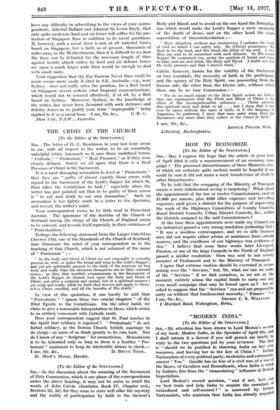THE CRISIS IN THE CHURCH [To the Editor of the
SPECTATOR.] SIR,—The letter of H. G. Rawlinson in your last issue seems to me, with all respect to the writer, to be an essentially unhelpful letter, inasmuch as it uses those undefined terms, " Catholic," " Protestant," " Real Presence," as if they were clearly defined. Surely we all agree that there is a Real Presence of Christ in the Sacrament.
It is a most damaging accusation to level at " Protestants" that they are " guilty of almost exactly those errors with regard to the Sacrament of the Lord's Supper for which St. Paul takes the Corinthians to task ! " especially when the writer has just pointed out that to be guilty of these errors is to eat and drink to our own damnation." Such an accusation is too lightly made in a letter to the Spectator, and reveals the writer's mind.
Your correspondent seems to be little read in Protestant doctrine. The ignorance of the doctrine of the Church of Scotland among the clergy of the Church of England seems to be colossal, and reveals itself especially in their criticisms of " Protestantism."
Perhaps the following statement from the Larger Catechism (Answer 170), one of the Standards of the Church of Scotland, may illuminate the mind of your correspondent as to the teaching of that Church, which is not ashamed of the name of " Protestant " :-
" As the body and blood of Christ are not corporally or carnally present in, with, or under the bread and wine in the Lord's Supper ; and yet are spiritually present to the faith of the receiver, no less truly and really than the elements themselves am to their outward senses ; so they that worthily communicate in the Sacrament of the Lord's Supper do therein feed upon the body and blood of Christ, not after a corporal and carnal, but in a spiritual manner ; yet truly and really, while by faith they receive and apply to them- selves Christ crucified, and all the benefits of His death."
In view of this quotation, it can hardly be said that " Protestants " " ignore these two crucial chapters " of the First Epistle to the Corinthians. On the other hand, we claim to give a reasonable interpretation to them, which seems to us entirely consonant with Catholic truth.
Does your correspondent suggest that St. Paul teaches in the Spirit that celibacy is enjoined ? " Protestants " do not forbid celibacy, as the Roman Church forbids marriage to its clergy—as some of us think greatly to its own hurt. Nor do I know of any " Scripture " for monasticism. Monasticism is to be tolerated only so long as there is a healthy " Pro- testant " sentiment to keep its intolerable abuses in check.— I am, Sir, &e., D. BRUCE NICOL. St. Mark's Manse, Dundee.


























































 Previous page
Previous page